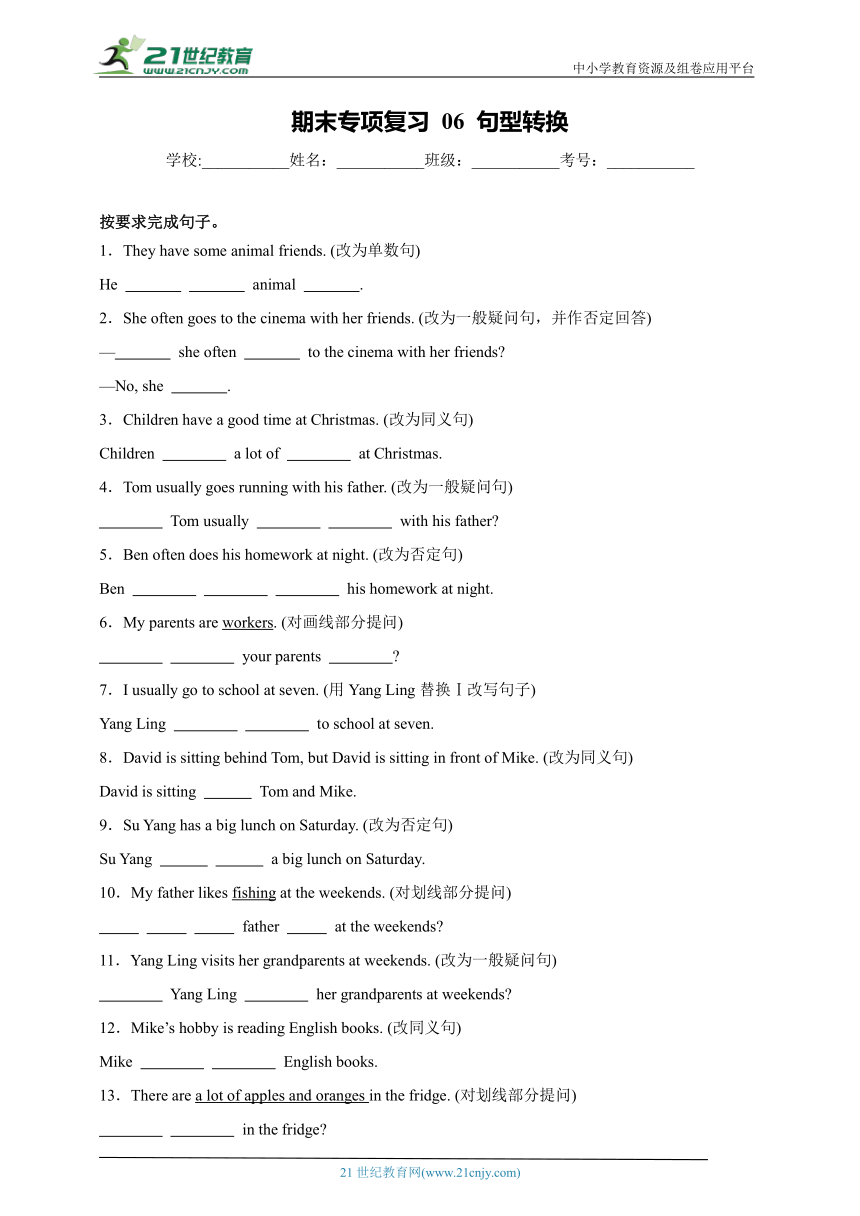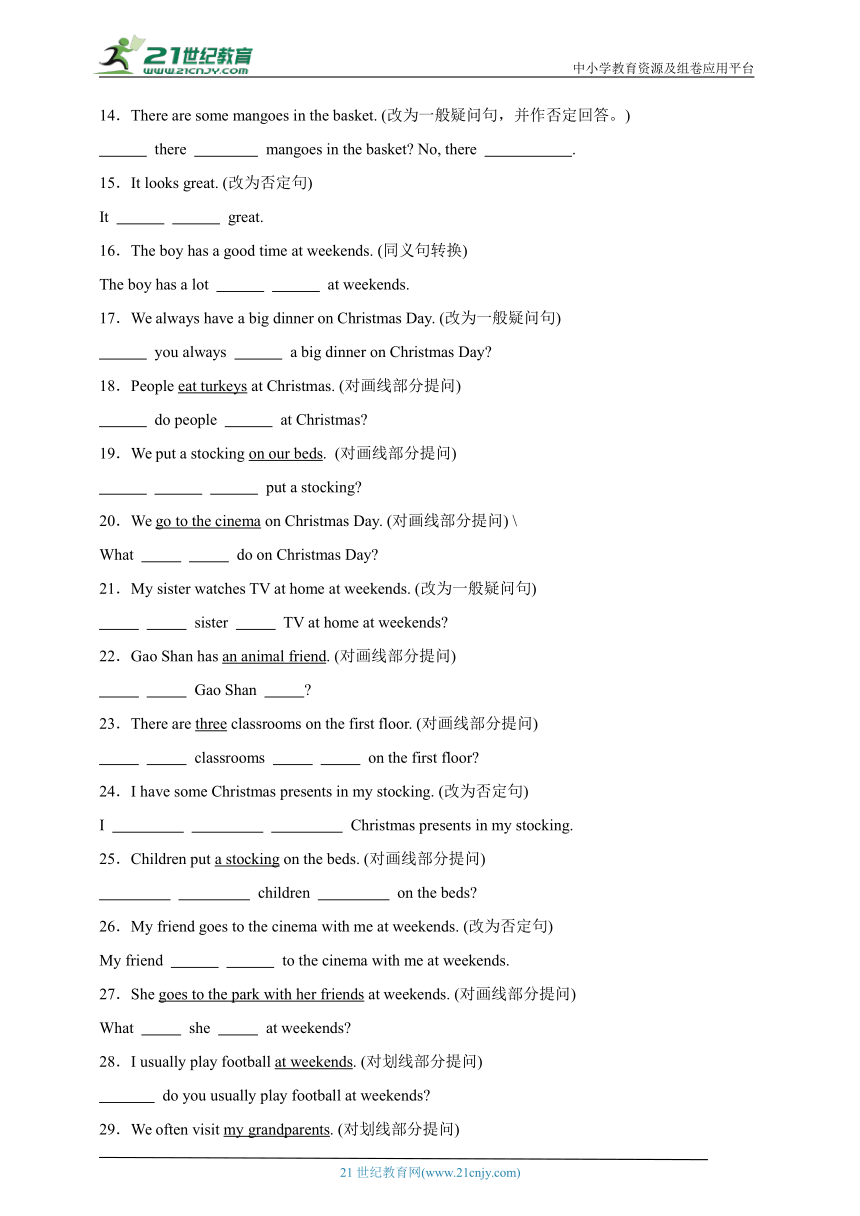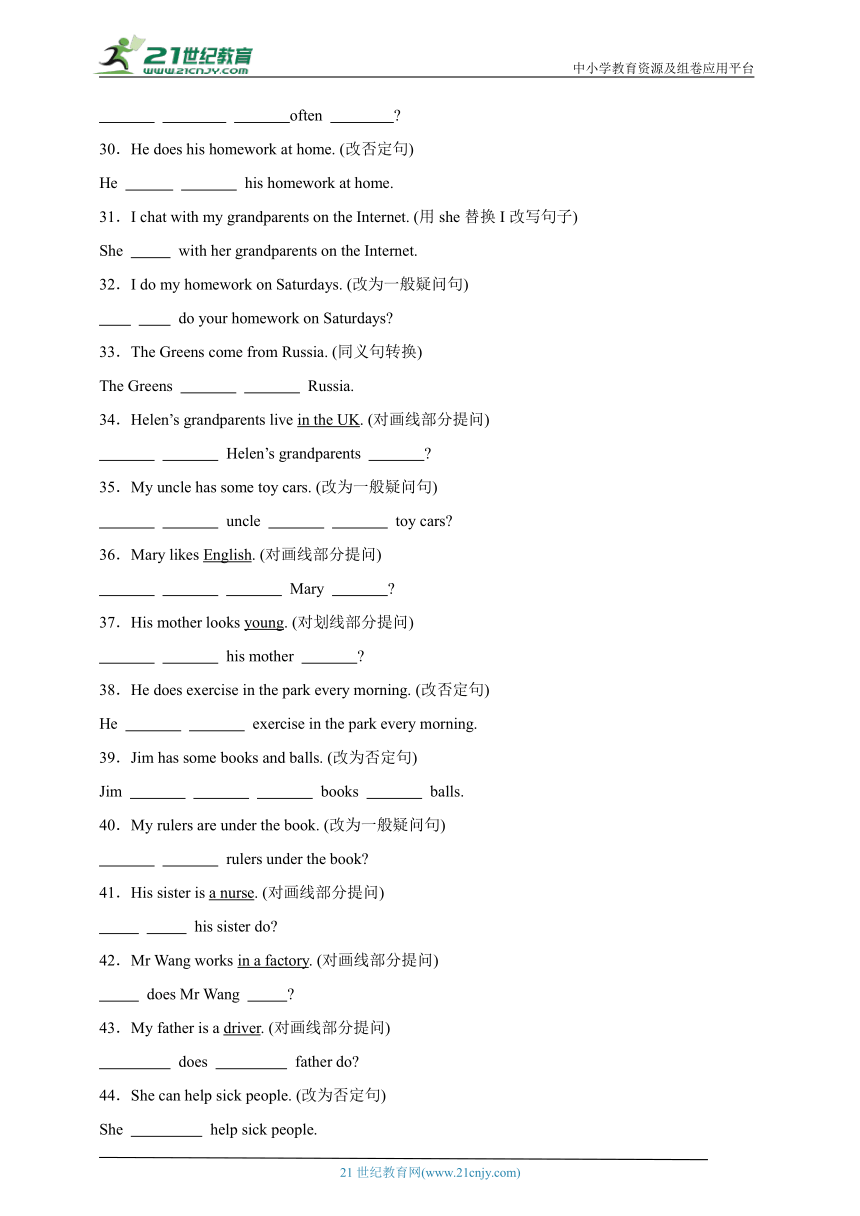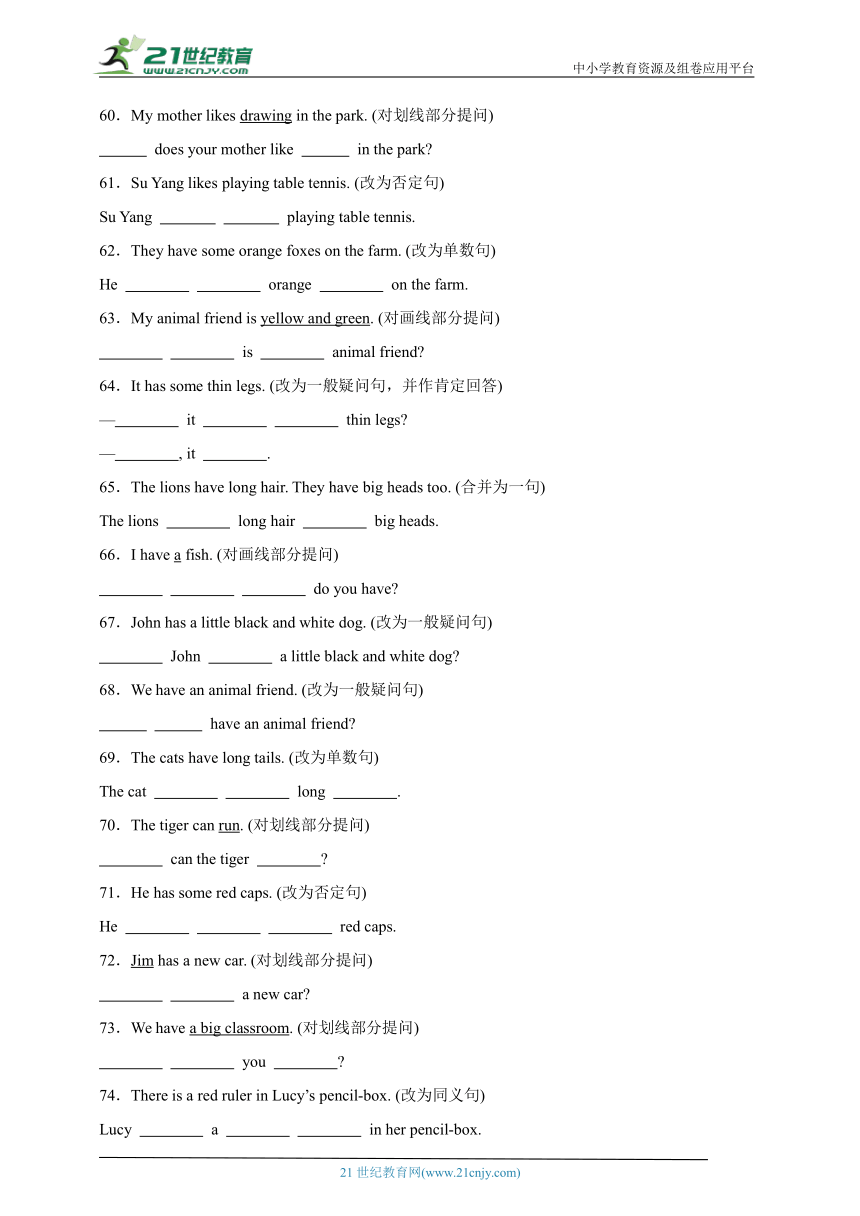专题06 句型转换(含答案)-2024-2025学年译林版(三起)五年级英语上学期期末专项练习
文档属性
| 名称 | 专题06 句型转换(含答案)-2024-2025学年译林版(三起)五年级英语上学期期末专项练习 |

|
|
| 格式 | docx | ||
| 文件大小 | 290.8KB | ||
| 资源类型 | 试卷 | ||
| 版本资源 | 牛津译林版 | ||
| 科目 | 英语 | ||
| 更新时间 | 2024-12-06 09:45:59 | ||
图片预览





文档简介
中小学教育资源及组卷应用平台
期末专项复习 06 句型转换
学校:___________姓名:___________班级:___________考号:___________
按要求完成句子。
1.They have some animal friends. (改为单数句)
He animal .
2.She often goes to the cinema with her friends. (改为一般疑问句,并作否定回答)
— she often to the cinema with her friends
—No, she .
3.Children have a good time at Christmas. (改为同义句)
Children a lot of at Christmas.
4.Tom usually goes running with his father. (改为一般疑问句)
Tom usually with his father
5.Ben often does his homework at night. (改为否定句)
Ben his homework at night.
6.My parents are workers. (对画线部分提问)
your parents
7.I usually go to school at seven. (用Yang Ling替换Ⅰ改写句子)
Yang Ling to school at seven.
8.David is sitting behind Tom, but David is sitting in front of Mike. (改为同义句)
David is sitting Tom and Mike.
9.Su Yang has a big lunch on Saturday. (改为否定句)
Su Yang a big lunch on Saturday.
10.My father likes fishing at the weekends. (对划线部分提问)
father at the weekends
11.Yang Ling visits her grandparents at weekends. (改为一般疑问句)
Yang Ling her grandparents at weekends
12.Mike’s hobby is reading English books. (改同义句)
Mike English books.
13.There are a lot of apples and oranges in the fridge. (对划线部分提问)
in the fridge
14.There are some mangoes in the basket. (改为一般疑问句,并作否定回答。)
there mangoes in the basket No, there .
15.It looks great. (改为否定句)
It great.
16.The boy has a good time at weekends. (同义句转换)
The boy has a lot at weekends.
17.We always have a big dinner on Christmas Day. (改为一般疑问句)
you always a big dinner on Christmas Day
18.People eat turkeys at Christmas. (对画线部分提问)
do people at Christmas
19.We put a stocking on our beds. (对画线部分提问)
put a stocking
20.We go to the cinema on Christmas Day. (对画线部分提问) \
What do on Christmas Day
21.My sister watches TV at home at weekends. (改为一般疑问句)
sister TV at home at weekends
22.Gao Shan has an animal friend. (对画线部分提问)
Gao Shan
23.There are three classrooms on the first floor. (对画线部分提问)
classrooms on the first floor
24.I have some Christmas presents in my stocking. (改为否定句)
I Christmas presents in my stocking.
25.Children put a stocking on the beds. (对画线部分提问)
children on the beds
26.My friend goes to the cinema with me at weekends. (改为否定句)
My friend to the cinema with me at weekends.
27.She goes to the park with her friends at weekends. (对画线部分提问)
What she at weekends
28.I usually play football at weekends. (对划线部分提问)
do you usually play football at weekends
29.We often visit my grandparents. (对划线部分提问)
often
30.He does his homework at home. (改否定句)
He his homework at home.
31.I chat with my grandparents on the Internet. (用she替换I改写句子)
She with her grandparents on the Internet.
32.I do my homework on Saturdays. (改为一般疑问句)
do your homework on Saturdays
33.The Greens come from Russia. (同义句转换)
The Greens Russia.
34.Helen’s grandparents live in the UK. (对画线部分提问)
Helen’s grandparents
35.My uncle has some toy cars. (改为一般疑问句)
uncle toy cars
36.Mary likes English. (对画线部分提问)
Mary
37.His mother looks young. (对划线部分提问)
his mother
38.He does exercise in the park every morning. (改否定句)
He exercise in the park every morning.
39.Jim has some books and balls. (改为否定句)
Jim books balls.
40.My rulers are under the book. (改为一般疑问句)
rulers under the book
41.His sister is a nurse. (对画线部分提问)
his sister do
42.Mr Wang works in a factory. (对画线部分提问)
does Mr Wang
43.My father is a driver. (对画线部分提问)
does father do
44.She can help sick people. (改为否定句)
She help sick people.
45.What's your mother's job (改为同义句)
your mother
46.My father is a teacher. My mother is a teacher, too. (合并为一句)
My are teachers.
47.The girl draws a nice dress for her mother. (对划线部分提问)
What the girl for her mother
48.There are some apples in the monkey’s hands. (改为单数句)
apple in the monkey’s .
49.There are some holes in my bag. (改为一般疑问句)
there holes in bag
50.Simon likes reading comic books too. (改为同义句)
Simon reading comic books.
51.There are some holes in my bag. (改一般疑问句,并作否定回答)
— there holes in your bag
— , .
52.There is no water in the glass. (改为同义句)
There is water in the glass.
53.David likes skating. Helen likes skating too. (合并为一句)
David and Helen skating.
54.I live in Greece. My uncle lives in Greece too. (合并为一句)
My uncle and I in Greece.
55.My cousin plays football after school. (改否定句)
My cousin football after school.
56.Her parent likes watching films and shopping. (改为同义句)
Her hobbies watching films and shopping.
57.Nancy likes dancing. (改为一般疑问句)
Nancy dancing
58.Old James likes making friends and drinking tea. (改为否定句)
Old James making friends drinking tea.
59.They like reading books. (改为否定句)
They reading books.
60.My mother likes drawing in the park. (对划线部分提问)
does your mother like in the park
61.Su Yang likes playing table tennis. (改为否定句)
Su Yang playing table tennis.
62.They have some orange foxes on the farm. (改为单数句)
He orange on the farm.
63.My animal friend is yellow and green. (对画线部分提问)
is animal friend
64.It has some thin legs. (改为一般疑问句,并作肯定回答)
— it thin legs
— , it .
65.The lions have long hair. They have big heads too. (合并为一句)
The lions long hair big heads.
66.I have a fish. (对画线部分提问)
do you have
67.John has a little black and white dog. (改为一般疑问句)
John a little black and white dog
68.We have an animal friend. (改为一般疑问句)
have an animal friend
69.The cats have long tails. (改为单数句)
The cat long .
70.The tiger can run. (对划线部分提问)
can the tiger
71.He has some red caps. (改为否定句)
He red caps.
72.Jim has a new car. (对划线部分提问)
a new car
73.We have a big classroom. (对划线部分提问)
you
74.There is a red ruler in Lucy’s pencil-box. (改为同义句)
Lucy a in her pencil-box.
75.The desk has four legs. (改为同义句)
four legs the desk.
76.There is an egg in the box. (对划线部分提问)
in the box
77.There are three books in the bag. (对划线部分提问)
books in the bag
78.There is a sunflower. (变一般疑问句)
a sunflower
79.There are two glasses of milk on the table. (对划线部分提问)
on the table
80.There are three bottles of water on the table. (对划线部分提问)
bottles of water on the table
参考答案
1. has an friend
【详解】原句句意:他们有一些动物朋友。本题考查句型转换。根据题干they对应的单数是he,故谓语动词have要用第三人称单数形式has,some变成单数要用a或者an,animal是以元音音素开头的单词,前面要用an,friends变为单数friend,故答案为has;an;friend。
2. Does go doesn’t
【详解】原句句意:她经常和她的朋友们去电影院。本题考查句型转换。含有动词的第三人称单数的陈述句改为一般疑问句,句首加助动词does,放在句首,首字母大写,谓语动词goes要变为原形,其它不变;做否定回答时,主语后要用助动词does的否定形式doesn’t,故答案为Does,go,doesn’t。
3. have fun
【详解】原句句意:圣诞节孩子们玩的很开心。本题考查句型转换,have a good time玩的愉快,其同义词组是have a lot of fun,故答案为have;fun。
4. Does go running
【详解】原句句意:汤姆通常和他父亲一起跑步。本题考查句型转换,原句是一般现在时,主语Tom是第三人称单数,改为一般疑问句需要借助于助动词does,goes要改为原形go,go running是动词词组,故running不变,故答案为Does;go;running。
5. doesn’t often do
【详解】句意:本经常晚上做作业。本题考查句型转换。时态是一般现在时态,含有实意动词的句子变否定句,需要借助助动词,主语是第三人称单数,在动词前加doesn’t,第三人称单数does还原到原形do,often是频度副词,放在助动词doesn’t后面,故答案为doesn’t;often;do。
6. What do do
【详解】原句句意:我父母是工人。本题考查句型转换,画线部分是workers,是职业,询问职业的句型一般用句型“What do/does +主语+do ”,主语your parents是复数,故助动词用do,故答案为What;do;do。
7. usually goes
【详解】原句句意:我通常七点钟去上学。本题考查句型转换,原句是一般现在时,主语Yang Ling是第三人称单数,故动词也用第三人称单数,go的单三形式是goes,usually不变,故答案为usually,goes。
8.between
【详解】原句句意:大卫坐在汤姆的后面,但大卫坐在迈克的前面。改为同义句:大卫坐在汤姆和迈克___。根据语境可知,between在……之间,符合题意,故答案为between。
9. doesn't have
【详解】原句句意:苏阳星期六吃了一顿丰盛的午餐。分析该句,主语Su Yang是第三人称单数,has是谓语动词。所以该句变为否定句,要借助于第三人称单数的助动词的否定形式doesn't,后面的动词改为原形have,故答案为doesn't;have。
10. What does your like
【详解】原句句意:我父亲喜欢在周末钓鱼。划线部分是fishing,所以要用what提问,后接一般疑问句。likes是第三人称单数,所以要借助助动词does,后接动词原形like,将my改为your,故答案为What;does;your;like。
11. Does visit
【详解】原句句意:杨玲周末去看望她的(外)祖父母。该句含实义动词visits,是第三人称单数,变为一般疑问句用助动词does引导。句子结构为:Does+主语+动词原形+其他?visits的动词原形为visit。故答案为Does;visit。
12. likes reading
【详解】句意:迈克的爱好是读英文书。题意要求改成同义句,该句时态为一般现在时,主语Mike为单数第三人称,谓语动词应用like的单数第三人称形式likes,like doing意为喜欢做某事,read(读)的动名词形式为reading,故答案为likes;reading。
13. What are
【详解】句意:冰箱里有很多苹果和橙子。题意要求对划线部分提问,该句时态为一般现在时,询问什么,应用疑问词what来引导,其后应接系动词are,故答案为What;are。
14. Are any aren’t
【详解】原句句意:在篮子里有一些芒果。该句是there be句型,改为一般疑问句将be动词are提前到句首,将some改为any,否定回答是No, there aren't. 故答案为Are;any;aren't。
15. doesn't look
【详解】原句句意:它看上去很棒。该句为一般现在时,主语是It ,改为否定句时助动词要用doesn't,同时looks要用原形look,故答案为doesn't;look。
16. of fun
【详解】句意:男孩周末玩的很开心。have a good time玩得很开心,也可用have a lot of fun来表示,故答案为of;fun。
17. Do have
【详解】句意:我们经常在圣诞节晚上吃大餐。原句属于陈述句,一般现在时态。改为一般疑问句需要添加助动词do并放在句首,动词have用原形,故答案为Do;have。
18. What do
【详解】句意:人们在圣诞节吃火鸡。句中划线部分是eat turkeys,是做事情,询问做什么用疑问词what,后接一般疑问句;用do代替划线部分eat turkeys,故答案为What;do。
19. Where do you
【详解】句意:我们在床上放了一只长筒袜。句中划线部分是地点,用疑问词where提问,后接一般疑问语序。因主语是we,助动词用do,we改为you,故答案为Where;do;you。
20. do you
【详解】原句句意:我们经常在圣诞节去电影院。画线部分是go to the cinema,故用what什么提问,后跟一般疑问句,将we改为you,故需加助动词do,故答案为do;you。
21. Does your watch
【详解】句意:我姐姐/妹妹周末在家看电视。根据动词watches可知该句是一般现在时,改为一般疑问句需要借助于助动词does,放在句首大写首字母,第一人称my要改为第二人称your,动词watches改为原形watch,故答案为Does;your;watch。
22. What does have
【详解】句意:高山有一个动物朋友。该句是一般现在时,划线部分是具体的事物,提问用特殊疑问词what,放在句首大写首字母,句中动词为has,故需要借助助动词does构成疑问句,放在特殊疑问词之后,动词has改为原形have,故答案为What;does;have。
23. How many are there
【详解】句意:一楼有三间教室。该句是there be句式,划线部分是three,对数量提问用how many,放在句首大写首字母,be动词are提前,故答案为How;many;are;there。
24. don't have any
【详解】句意:在我的长筒袜里有一些圣诞礼物。此题考查肯定句变否定句,主语是I,一般现在时的句子,借助于助动词don't来变,后加动词原形,some用于肯定句式中,any用于否定句式中,故答案为don't;have;any。
25. What do put
【详解】句意:孩子们把长筒袜放在床上。此题考查对画线部分进行提问,对长筒袜进行提问:应问:孩子们把什么放在床上,应用what引导的特殊疑问句,What+助动词+主语+动词原形+其他,故答案为What;do;put。
26. Doesn’t go
【详解】原句句意:我的朋友和我在周末去电影院。本题考查句型转换,goes是实义动词的第三人称单数,改为否定句需加助动词doesn’t,goes变回原形。故答案为doesn’t;go。
27. does do
【详解】原句句意:她在周末和朋友们一起去公园。本题考查特殊疑问句,画线部分是goes to the park with her friends,用what提问,goes是实义动词第三人称单数,助动词用does,即她在周末做什么?What does she do at weekends 故答案为does;do。
28.When
【详解】原句句意:我通常在周末踢足球。本题考查特殊疑问句,画线部分是at weekends,用when提问,后跟一般疑问句,故答案为When。
29. Who do you visit
【详解】句意:我们经常看望我的祖父母。本题考查特殊疑问句,划线部分是my grandparents,用who提问,问句结构为:Who+助动词+主语+动词原形+其他?将we改为you,句子是一般现在时,助动词用do,后跟动词原形,故答案为Who;do;you;visit。
30. doesn’t do
【详解】句意:他在家写家庭作业。本题考查句型转换,does实义动词,He是单数第三人称,改为否定句需加助动词doesn’t,does变回原形do。故答案为doesn’t;do。
31.chats
【详解】原句句意:我在网上和我的爷爷奶奶聊天。本题考查句型转换,该句是一般现在时,用she替换I改写句子,即将主语改为单数第三人称,谓语动词chat变为第三人称单数形式chats。故答案为chats。
32. Do you
【详解】原句句意:我星期六做作业。原句是一般现在时,主语I变you,助动词用do,故答案为Do,you。
33. are from
【详解】原句句意:格林一家来自俄罗斯。本题考查句型转换,根据句意可知,该句是陈述句,时态为一般现在时,come from=be from来自,主语The Greens是一家人,be动词用are,故答案为are;from。
34. Where do live
【详解】原句句意:海伦的祖父母住在英国。本题考查特殊疑问句,画线部分是地点,用where提问,问句结构为:Where+助动词+主语+动词原形?主语Helen’s grandparents是第三人称复数,句子是一般现在时,助动词用do,故答案为Where,do,live。
35. Does your have any
【详解】原句句意:我叔叔有一些玩具车。本题考查句型转换,根据句意可知,该句时态为一般现在时,句中有实意动词has,变为一般疑问句,要借助助动词does,my变为your,some变为any,故答案为Does;your;have;any。
36. What subject does like
【详解】原句句意:玛丽喜欢英语。本题考查特殊疑问句,画线部分是English,用what subject提问,问句结构为:What subject +助动词+主语+动词原形+其他?主语Mary是第三人称单数,句子是一般现在时,助动词用does,likes变原形like,故答案为What;subject;does;like。
37. How does look
【详解】原句句意:他妈妈看起来很年轻。本题考查how引导的特殊疑问句。划线部分是形容长相的形容词,用how进行提问,句子是一般现在时,主语是第三人称单数his mother,所以how后面借助助动词does构成疑问句,句中实义动词look用原形,故答案为How;does;look。
38. doesn’t do
【详解】句意:他每天早上在公园锻炼。本题考查肯定句与否定句的转换。句子中有实义动词d oes,变为否定句在助动词后面加not,does not可以缩写为doesn’t,后面加动词原形,does的动词原形为do。故答案为doesn’t;do。
39. doesn’t have any or
【详解】句意:吉姆有一些书和球。本题考查肯定句与否定句的转换。句子中有实义动词has,否定句在实义动词前加助动词的否定形式。句子为陈述句,一般现在时态,主语Jim是第三人称单数,助动词用does,否定形式为doesn’t,后面加动词原形,has的动词原形为have。肯定句中的some在否定句中变成any,连词and变成or。故答案为doesn't;have;any;or。
40. Are your
【详解】原句句意:我的尺子在书下面。本题考查系动词引导的一般疑问句。原句中含有be动词are,变为一般疑问句将are提前,my变为your,句末变问号,故答案为Are;your。
41. What does
【详解】句意:他的姐姐/妹妹是一名护士。划线部分是一名护士,对职业提问用疑问代词What,主语his sister是第三人称单数,助动词用does,故答案为What;does。
42. Where work
【详解】句意:王先生在工厂工作。划线部分是in a factory,故用where哪里提问,后跟一般疑问句,does后跟动词原形,故答案为Where;work。
43. What your
【详解】句意:我的爸爸是一名司机。划线部分是职业,用疑问代词what提问,特殊疑问句句子结构为:What+助动词+主语+do?原句主语为My father,问句主语可以为your father,助动词用does,故答案为What;your。
44.can't
【详解】原句句意:她可以帮助病人。改为否定句在can后加not,可缩写为can't,故答案为can't。
45. What does do
【详解】句意:你妈妈的工作是什么?改为同义句,可知句意为你妈妈是做什么的?What引导的特殊疑问句,句子是一般现在时,主语your mother 是第三人称单数,助动词用does,does后面接动词原形do,故答案为What;does;do。
46. parents both
【详解】句意:我的爸爸是一名老师。我的妈妈也是一名老师。爸爸妈妈可以说是父母亲parents;两个both。我的父母两个都是老师。My parents are both teachers.故答案为parents;both。
47. does draw
【详解】原句句意:那个女孩给她的妈妈画了一件漂亮的裙子。本题考查句型转换。划线部分是画的内容,用what提问,问句为:女孩给她的妈妈画什么?问句结构为:What+助动词+主语+动词原形+其他。句子是一般现在时,主语the girl是第三人称单数,助动词用does,draws变为动词原形draw,故答案为does;draw。
48. There’s an hand
【详解】原句句意:猴子的手里有一些苹果。本题考查句型转换。根据原句句意可知,句子是陈述句肯定形式。他们there are改为there is=there’s,首字母大写。因为苹果apple首字母是以元音音素开头,所以一些some变为an,手hands变为hand,故答案为There’s;an;hand。
49. Are any your
【详解】原句句意:我的包里有一些洞。本题考查句型转换,原句是there be句式,改为一般疑问句把be动词are提前,放在句首,some用于肯定句,any用于否定句与疑问句,故some要改为any,第一人称my改为第二人称your,故答案为Are;any;your。
50. also likes
【详解】句意:西蒙也喜欢看漫画书。本题考查句型转换,too也,用于句末,其同义词为also,用于句中,动词likes不变,故答案为also;likes。
51. Are any No there aren't
【详解】句意:在我的包里有一些洞。改一般疑问句,并作否定回答。there be句型的一般疑问句是be动词提前,本题的be动词是are,放于句首首字母大写,因此第一空填Are。改一般疑问句要将some变为any,因此第二空填any。there be句型否定回答是No,there aren't。因此第三空填No,第四空填there aren't。故答案为Are;any;No;there aren't。
52. not any
【详解】句意:杯子里没有水。is no=is not any,故改为同义句There is not any water in the glass.故答案为not;any。
53. both like
【详解】句意:大卫喜欢滑冰。海伦也喜欢滑冰。本题考查句型转换,根据句意可知该句是陈述句,时态为一般现在时,表示两者都用both,主语David and Helen是两个人,谓语动词like用原形,故答案为both;like。
54.both live
【详解】原句句意:我住在希腊。我叔叔也住在希腊。本题考查句型转换,题干要求合并为一句,合并后句意为:我和我叔叔两个都住在希腊。My uncle and I both live in Greece。both表示两个都,故答案为both live。
55. doesn’t play
【详解】句意:我的表弟(堂弟/表哥/表姐等)放学后踢足球。本题考查句型转换。时态是一般现在时态,主语是第三人称单数,否定句的助动词用doesn’t,动词play用原形,故答案为doesn’t;play。
56. parent’s are
【详解】原句句意:她父母喜欢看电影和购物。本题考查句型转换。同义句可为:她父母的爱好是看电影和购物。父母的parent’s,是are,故答案为parent’s;are。
57. Does like
【详解】原句句意:南茜喜欢跳舞。本题考查句型转换。原句谓语动词likes是第三人称单数,改为一般疑问句,助动词用does,likes变原形like,故答案为Does,like。
58. doesn’t like or
【详解】原句句意:老詹姆斯喜欢交朋友和喝茶。本题考查句型转换。句子是陈述句,时态是一般现在时。句中有实义动词likes,主语Old James是第三人称单数,变否定句需借助助动词doesn’t,likes变为like,and变为or,故答案为doesn’t;like;or。
59. don’t like
【详解】原句句意:他们喜欢读书。本题考查句型转换,like是实义动词,They是复数人称,改为否定句需加助动词don’t,后跟动词原形。故答案为don’t;like。
60. What doing
【详解】原句句意:我妈妈喜欢在公园里画画。本题考查句型转换,划线部分是drawing,用what提问,即你妈妈喜欢在公园里做什么?做do,like doing喜欢做。故答案为What;doing。
61. doesn’t like
【详解】原句句意:苏阳喜欢打乒乓球。本题考查句型转换。likes是实义动词的第三人称单数,改为否定句要借助助动词does,后接not构成否定,does not缩写为doesn’t;助动词后接动词原形like。故答案为doesn’t;like。
62. has an fox
【详解】本题考查句型转换。原句句意:在农场他们有一些橘色的狐狸。要改为单数句,他们they变为他he,有have变为has,一些橘色的狐狸some orange foxes变为一只橘色的狐狸an orange fox,故答案为has;an;fox。
63. What colour your
【详解】本题考查句型转换。原句句意:我的动物朋友是黄绿色的。对画线部分进行提问,询问是什么颜色的,用what colour,注意人称的变化,我的my变为你的your,故答案为What;colour;your。
64. Does have any Yes does
【详解】句意:它有一些瘦腿。本题考查句型转换。本题的时态是一般现在时态,含有实意动词的句子变一般疑问句,需要借助助动词,结构是助动词+主语+动词原形+ 其他?主语是it,助动词是does,放在句首,首字母要大写,第三人称单数has需要还原到原形have,some变成any。肯定回答是Yes,主语+助动词,本题主语是it,助动词是does,肯定回答是Yes,it does.故答案为Does;have;any;Yes;does。
65. have and
【详解】本题考查句型转换。原句句意:狮子有长头发。它们还有大脑袋。合并成一句,句意:狮子有长头发和大脑袋。并列连词用and,故答案为have;and。
66. How many fish
【详解】原句句意:我有一条鱼。本题考查句型转换,划线部分a(一个)表示数量,用how many提问,fish作可数名词指“鱼的条数”的时候单数和复数形式相同。句意为:你有多少条鱼?故答案为How,many,fish。
67. Does have
【详解】原句句意:约翰有一只黑白相间的小狗。本题考查句型转化,句子是一般现在时,主语是John,改为一般疑问句用助动词does提问,后接动词原形,故has变为have,后面不变,结构为Does+主语+动词原形+其他,故答案为Does,have。
68. Do you
【详解】原句句意:我们有一个动物朋友。本题考查句型转换,have是实义动词,将we改为you,改为一般疑问句需加助动词do,后跟动词原形。故答案为Do;you。
69. has a tail
【详解】原句句意:猫有长尾巴。本题考查句型转换,改为单数句将the cats改为the cat,have改为第三人称单数形式has,long tails改为单数形式a long tail。故答案为has;a;tail。
70. What do
【详解】原句句意:老虎会跑。本题考查句型转换,划线部分是会做的事情,用what提问,问句句意为:老虎会做什么?做do,can后跟动词原形,故答案为What,do。
71. doesn’t have any
【详解】句意:他有一些红色的帽子。本题考查句型转换,句子是一般现在时,主语He是第三人称单数,改为否定句,在主语后面加doesn’t,has改为原形have,some在否定句中要用any,故答案为doesn’t;have;any。
72. Who has
【详解】原句句意:吉姆有一辆新车。本题考查特殊疑问句,划线部分是人,用who提问,who做主语,后面的动词用第三人称单数,故答案为Who,has。
73. What do have
【详解】原句句意:我们有一个大教室。本题考查特殊疑问句,划线部分是有的内容,用what提问,问句句意为:你们有什么?问句结构为:What+助动词+主语+动词原形?主语是you,句子是一般现在时,助动词用do,故答案为What,do,have。
74. has red ruler
【详解】原句句意:露西的铅笔盒里有一把红色的尺子。本题考查句型转换,题干要求改为同义句,句意为:露西有一把红色的尺子在铅笔盒里。主语Lucy是第三人称单数,“有”用第三人称单数形式has,红色的尺子red ruler,故答案为has,red,ruler。
75. There are in
【详解】句意:桌子有四条腿。本题考查同义句转换。根据题干可知,本题为一般现在时。改为同义句,用there be句型,根据four legs为复数,be动词也用复数形式are,放于句首首字母大写There。第一空填There,第二空填are。根据常识可知,桌子有四条腿,用介词in。第三空填in。故答案为There;are;in。
76.What’s
【详解】原句句意:盒子里有一个鸡蛋。本题考查特殊疑问句,划线部分是an egg,用what提问,即盒子里有什么?What’s in the box 又因为开头要大写,默认一空一词,故答案为What’s。
77. How many are there
【详解】原句句意:包里有三本书。本题考查特殊疑问句,划线部分是数量,books是可数名词复数,用how many提问,how many books后跟there are引导的一般疑问句,故答案为How,many,are,there。
78. Is there
【详解】原句句意:有一朵向日葵。本题考查句型转换,变一般疑问句将is提前即可。句首首字母大写。故答案为Is;there。
79. How much milk is there
【详解】原句句意:桌子上有两瓶牛奶。本题考查特殊疑问句,划线部分是two glasaaes of,可知问句提问数量,milk是不可数名词,用how much提问,后跟一般疑问句。故答案为How;much;milk;is;there。
80. How many are there
【详解】句意:桌子上有三瓶水。本题考查特殊疑问句。划线部分是数量,bottles是可数名词复数,用How many提问,后面跟are引导的一般疑问句。故答案为How;many;are;there。
21世纪教育网 www.21cnjy.com 精品试卷·第 2 页 (共 2 页)
21世纪教育网(www.21cnjy.com)
期末专项复习 06 句型转换
学校:___________姓名:___________班级:___________考号:___________
按要求完成句子。
1.They have some animal friends. (改为单数句)
He animal .
2.She often goes to the cinema with her friends. (改为一般疑问句,并作否定回答)
— she often to the cinema with her friends
—No, she .
3.Children have a good time at Christmas. (改为同义句)
Children a lot of at Christmas.
4.Tom usually goes running with his father. (改为一般疑问句)
Tom usually with his father
5.Ben often does his homework at night. (改为否定句)
Ben his homework at night.
6.My parents are workers. (对画线部分提问)
your parents
7.I usually go to school at seven. (用Yang Ling替换Ⅰ改写句子)
Yang Ling to school at seven.
8.David is sitting behind Tom, but David is sitting in front of Mike. (改为同义句)
David is sitting Tom and Mike.
9.Su Yang has a big lunch on Saturday. (改为否定句)
Su Yang a big lunch on Saturday.
10.My father likes fishing at the weekends. (对划线部分提问)
father at the weekends
11.Yang Ling visits her grandparents at weekends. (改为一般疑问句)
Yang Ling her grandparents at weekends
12.Mike’s hobby is reading English books. (改同义句)
Mike English books.
13.There are a lot of apples and oranges in the fridge. (对划线部分提问)
in the fridge
14.There are some mangoes in the basket. (改为一般疑问句,并作否定回答。)
there mangoes in the basket No, there .
15.It looks great. (改为否定句)
It great.
16.The boy has a good time at weekends. (同义句转换)
The boy has a lot at weekends.
17.We always have a big dinner on Christmas Day. (改为一般疑问句)
you always a big dinner on Christmas Day
18.People eat turkeys at Christmas. (对画线部分提问)
do people at Christmas
19.We put a stocking on our beds. (对画线部分提问)
put a stocking
20.We go to the cinema on Christmas Day. (对画线部分提问) \
What do on Christmas Day
21.My sister watches TV at home at weekends. (改为一般疑问句)
sister TV at home at weekends
22.Gao Shan has an animal friend. (对画线部分提问)
Gao Shan
23.There are three classrooms on the first floor. (对画线部分提问)
classrooms on the first floor
24.I have some Christmas presents in my stocking. (改为否定句)
I Christmas presents in my stocking.
25.Children put a stocking on the beds. (对画线部分提问)
children on the beds
26.My friend goes to the cinema with me at weekends. (改为否定句)
My friend to the cinema with me at weekends.
27.She goes to the park with her friends at weekends. (对画线部分提问)
What she at weekends
28.I usually play football at weekends. (对划线部分提问)
do you usually play football at weekends
29.We often visit my grandparents. (对划线部分提问)
often
30.He does his homework at home. (改否定句)
He his homework at home.
31.I chat with my grandparents on the Internet. (用she替换I改写句子)
She with her grandparents on the Internet.
32.I do my homework on Saturdays. (改为一般疑问句)
do your homework on Saturdays
33.The Greens come from Russia. (同义句转换)
The Greens Russia.
34.Helen’s grandparents live in the UK. (对画线部分提问)
Helen’s grandparents
35.My uncle has some toy cars. (改为一般疑问句)
uncle toy cars
36.Mary likes English. (对画线部分提问)
Mary
37.His mother looks young. (对划线部分提问)
his mother
38.He does exercise in the park every morning. (改否定句)
He exercise in the park every morning.
39.Jim has some books and balls. (改为否定句)
Jim books balls.
40.My rulers are under the book. (改为一般疑问句)
rulers under the book
41.His sister is a nurse. (对画线部分提问)
his sister do
42.Mr Wang works in a factory. (对画线部分提问)
does Mr Wang
43.My father is a driver. (对画线部分提问)
does father do
44.She can help sick people. (改为否定句)
She help sick people.
45.What's your mother's job (改为同义句)
your mother
46.My father is a teacher. My mother is a teacher, too. (合并为一句)
My are teachers.
47.The girl draws a nice dress for her mother. (对划线部分提问)
What the girl for her mother
48.There are some apples in the monkey’s hands. (改为单数句)
apple in the monkey’s .
49.There are some holes in my bag. (改为一般疑问句)
there holes in bag
50.Simon likes reading comic books too. (改为同义句)
Simon reading comic books.
51.There are some holes in my bag. (改一般疑问句,并作否定回答)
— there holes in your bag
— , .
52.There is no water in the glass. (改为同义句)
There is water in the glass.
53.David likes skating. Helen likes skating too. (合并为一句)
David and Helen skating.
54.I live in Greece. My uncle lives in Greece too. (合并为一句)
My uncle and I in Greece.
55.My cousin plays football after school. (改否定句)
My cousin football after school.
56.Her parent likes watching films and shopping. (改为同义句)
Her hobbies watching films and shopping.
57.Nancy likes dancing. (改为一般疑问句)
Nancy dancing
58.Old James likes making friends and drinking tea. (改为否定句)
Old James making friends drinking tea.
59.They like reading books. (改为否定句)
They reading books.
60.My mother likes drawing in the park. (对划线部分提问)
does your mother like in the park
61.Su Yang likes playing table tennis. (改为否定句)
Su Yang playing table tennis.
62.They have some orange foxes on the farm. (改为单数句)
He orange on the farm.
63.My animal friend is yellow and green. (对画线部分提问)
is animal friend
64.It has some thin legs. (改为一般疑问句,并作肯定回答)
— it thin legs
— , it .
65.The lions have long hair. They have big heads too. (合并为一句)
The lions long hair big heads.
66.I have a fish. (对画线部分提问)
do you have
67.John has a little black and white dog. (改为一般疑问句)
John a little black and white dog
68.We have an animal friend. (改为一般疑问句)
have an animal friend
69.The cats have long tails. (改为单数句)
The cat long .
70.The tiger can run. (对划线部分提问)
can the tiger
71.He has some red caps. (改为否定句)
He red caps.
72.Jim has a new car. (对划线部分提问)
a new car
73.We have a big classroom. (对划线部分提问)
you
74.There is a red ruler in Lucy’s pencil-box. (改为同义句)
Lucy a in her pencil-box.
75.The desk has four legs. (改为同义句)
four legs the desk.
76.There is an egg in the box. (对划线部分提问)
in the box
77.There are three books in the bag. (对划线部分提问)
books in the bag
78.There is a sunflower. (变一般疑问句)
a sunflower
79.There are two glasses of milk on the table. (对划线部分提问)
on the table
80.There are three bottles of water on the table. (对划线部分提问)
bottles of water on the table
参考答案
1. has an friend
【详解】原句句意:他们有一些动物朋友。本题考查句型转换。根据题干they对应的单数是he,故谓语动词have要用第三人称单数形式has,some变成单数要用a或者an,animal是以元音音素开头的单词,前面要用an,friends变为单数friend,故答案为has;an;friend。
2. Does go doesn’t
【详解】原句句意:她经常和她的朋友们去电影院。本题考查句型转换。含有动词的第三人称单数的陈述句改为一般疑问句,句首加助动词does,放在句首,首字母大写,谓语动词goes要变为原形,其它不变;做否定回答时,主语后要用助动词does的否定形式doesn’t,故答案为Does,go,doesn’t。
3. have fun
【详解】原句句意:圣诞节孩子们玩的很开心。本题考查句型转换,have a good time玩的愉快,其同义词组是have a lot of fun,故答案为have;fun。
4. Does go running
【详解】原句句意:汤姆通常和他父亲一起跑步。本题考查句型转换,原句是一般现在时,主语Tom是第三人称单数,改为一般疑问句需要借助于助动词does,goes要改为原形go,go running是动词词组,故running不变,故答案为Does;go;running。
5. doesn’t often do
【详解】句意:本经常晚上做作业。本题考查句型转换。时态是一般现在时态,含有实意动词的句子变否定句,需要借助助动词,主语是第三人称单数,在动词前加doesn’t,第三人称单数does还原到原形do,often是频度副词,放在助动词doesn’t后面,故答案为doesn’t;often;do。
6. What do do
【详解】原句句意:我父母是工人。本题考查句型转换,画线部分是workers,是职业,询问职业的句型一般用句型“What do/does +主语+do ”,主语your parents是复数,故助动词用do,故答案为What;do;do。
7. usually goes
【详解】原句句意:我通常七点钟去上学。本题考查句型转换,原句是一般现在时,主语Yang Ling是第三人称单数,故动词也用第三人称单数,go的单三形式是goes,usually不变,故答案为usually,goes。
8.between
【详解】原句句意:大卫坐在汤姆的后面,但大卫坐在迈克的前面。改为同义句:大卫坐在汤姆和迈克___。根据语境可知,between在……之间,符合题意,故答案为between。
9. doesn't have
【详解】原句句意:苏阳星期六吃了一顿丰盛的午餐。分析该句,主语Su Yang是第三人称单数,has是谓语动词。所以该句变为否定句,要借助于第三人称单数的助动词的否定形式doesn't,后面的动词改为原形have,故答案为doesn't;have。
10. What does your like
【详解】原句句意:我父亲喜欢在周末钓鱼。划线部分是fishing,所以要用what提问,后接一般疑问句。likes是第三人称单数,所以要借助助动词does,后接动词原形like,将my改为your,故答案为What;does;your;like。
11. Does visit
【详解】原句句意:杨玲周末去看望她的(外)祖父母。该句含实义动词visits,是第三人称单数,变为一般疑问句用助动词does引导。句子结构为:Does+主语+动词原形+其他?visits的动词原形为visit。故答案为Does;visit。
12. likes reading
【详解】句意:迈克的爱好是读英文书。题意要求改成同义句,该句时态为一般现在时,主语Mike为单数第三人称,谓语动词应用like的单数第三人称形式likes,like doing意为喜欢做某事,read(读)的动名词形式为reading,故答案为likes;reading。
13. What are
【详解】句意:冰箱里有很多苹果和橙子。题意要求对划线部分提问,该句时态为一般现在时,询问什么,应用疑问词what来引导,其后应接系动词are,故答案为What;are。
14. Are any aren’t
【详解】原句句意:在篮子里有一些芒果。该句是there be句型,改为一般疑问句将be动词are提前到句首,将some改为any,否定回答是No, there aren't. 故答案为Are;any;aren't。
15. doesn't look
【详解】原句句意:它看上去很棒。该句为一般现在时,主语是It ,改为否定句时助动词要用doesn't,同时looks要用原形look,故答案为doesn't;look。
16. of fun
【详解】句意:男孩周末玩的很开心。have a good time玩得很开心,也可用have a lot of fun来表示,故答案为of;fun。
17. Do have
【详解】句意:我们经常在圣诞节晚上吃大餐。原句属于陈述句,一般现在时态。改为一般疑问句需要添加助动词do并放在句首,动词have用原形,故答案为Do;have。
18. What do
【详解】句意:人们在圣诞节吃火鸡。句中划线部分是eat turkeys,是做事情,询问做什么用疑问词what,后接一般疑问句;用do代替划线部分eat turkeys,故答案为What;do。
19. Where do you
【详解】句意:我们在床上放了一只长筒袜。句中划线部分是地点,用疑问词where提问,后接一般疑问语序。因主语是we,助动词用do,we改为you,故答案为Where;do;you。
20. do you
【详解】原句句意:我们经常在圣诞节去电影院。画线部分是go to the cinema,故用what什么提问,后跟一般疑问句,将we改为you,故需加助动词do,故答案为do;you。
21. Does your watch
【详解】句意:我姐姐/妹妹周末在家看电视。根据动词watches可知该句是一般现在时,改为一般疑问句需要借助于助动词does,放在句首大写首字母,第一人称my要改为第二人称your,动词watches改为原形watch,故答案为Does;your;watch。
22. What does have
【详解】句意:高山有一个动物朋友。该句是一般现在时,划线部分是具体的事物,提问用特殊疑问词what,放在句首大写首字母,句中动词为has,故需要借助助动词does构成疑问句,放在特殊疑问词之后,动词has改为原形have,故答案为What;does;have。
23. How many are there
【详解】句意:一楼有三间教室。该句是there be句式,划线部分是three,对数量提问用how many,放在句首大写首字母,be动词are提前,故答案为How;many;are;there。
24. don't have any
【详解】句意:在我的长筒袜里有一些圣诞礼物。此题考查肯定句变否定句,主语是I,一般现在时的句子,借助于助动词don't来变,后加动词原形,some用于肯定句式中,any用于否定句式中,故答案为don't;have;any。
25. What do put
【详解】句意:孩子们把长筒袜放在床上。此题考查对画线部分进行提问,对长筒袜进行提问:应问:孩子们把什么放在床上,应用what引导的特殊疑问句,What+助动词+主语+动词原形+其他,故答案为What;do;put。
26. Doesn’t go
【详解】原句句意:我的朋友和我在周末去电影院。本题考查句型转换,goes是实义动词的第三人称单数,改为否定句需加助动词doesn’t,goes变回原形。故答案为doesn’t;go。
27. does do
【详解】原句句意:她在周末和朋友们一起去公园。本题考查特殊疑问句,画线部分是goes to the park with her friends,用what提问,goes是实义动词第三人称单数,助动词用does,即她在周末做什么?What does she do at weekends 故答案为does;do。
28.When
【详解】原句句意:我通常在周末踢足球。本题考查特殊疑问句,画线部分是at weekends,用when提问,后跟一般疑问句,故答案为When。
29. Who do you visit
【详解】句意:我们经常看望我的祖父母。本题考查特殊疑问句,划线部分是my grandparents,用who提问,问句结构为:Who+助动词+主语+动词原形+其他?将we改为you,句子是一般现在时,助动词用do,后跟动词原形,故答案为Who;do;you;visit。
30. doesn’t do
【详解】句意:他在家写家庭作业。本题考查句型转换,does实义动词,He是单数第三人称,改为否定句需加助动词doesn’t,does变回原形do。故答案为doesn’t;do。
31.chats
【详解】原句句意:我在网上和我的爷爷奶奶聊天。本题考查句型转换,该句是一般现在时,用she替换I改写句子,即将主语改为单数第三人称,谓语动词chat变为第三人称单数形式chats。故答案为chats。
32. Do you
【详解】原句句意:我星期六做作业。原句是一般现在时,主语I变you,助动词用do,故答案为Do,you。
33. are from
【详解】原句句意:格林一家来自俄罗斯。本题考查句型转换,根据句意可知,该句是陈述句,时态为一般现在时,come from=be from来自,主语The Greens是一家人,be动词用are,故答案为are;from。
34. Where do live
【详解】原句句意:海伦的祖父母住在英国。本题考查特殊疑问句,画线部分是地点,用where提问,问句结构为:Where+助动词+主语+动词原形?主语Helen’s grandparents是第三人称复数,句子是一般现在时,助动词用do,故答案为Where,do,live。
35. Does your have any
【详解】原句句意:我叔叔有一些玩具车。本题考查句型转换,根据句意可知,该句时态为一般现在时,句中有实意动词has,变为一般疑问句,要借助助动词does,my变为your,some变为any,故答案为Does;your;have;any。
36. What subject does like
【详解】原句句意:玛丽喜欢英语。本题考查特殊疑问句,画线部分是English,用what subject提问,问句结构为:What subject +助动词+主语+动词原形+其他?主语Mary是第三人称单数,句子是一般现在时,助动词用does,likes变原形like,故答案为What;subject;does;like。
37. How does look
【详解】原句句意:他妈妈看起来很年轻。本题考查how引导的特殊疑问句。划线部分是形容长相的形容词,用how进行提问,句子是一般现在时,主语是第三人称单数his mother,所以how后面借助助动词does构成疑问句,句中实义动词look用原形,故答案为How;does;look。
38. doesn’t do
【详解】句意:他每天早上在公园锻炼。本题考查肯定句与否定句的转换。句子中有实义动词d oes,变为否定句在助动词后面加not,does not可以缩写为doesn’t,后面加动词原形,does的动词原形为do。故答案为doesn’t;do。
39. doesn’t have any or
【详解】句意:吉姆有一些书和球。本题考查肯定句与否定句的转换。句子中有实义动词has,否定句在实义动词前加助动词的否定形式。句子为陈述句,一般现在时态,主语Jim是第三人称单数,助动词用does,否定形式为doesn’t,后面加动词原形,has的动词原形为have。肯定句中的some在否定句中变成any,连词and变成or。故答案为doesn't;have;any;or。
40. Are your
【详解】原句句意:我的尺子在书下面。本题考查系动词引导的一般疑问句。原句中含有be动词are,变为一般疑问句将are提前,my变为your,句末变问号,故答案为Are;your。
41. What does
【详解】句意:他的姐姐/妹妹是一名护士。划线部分是一名护士,对职业提问用疑问代词What,主语his sister是第三人称单数,助动词用does,故答案为What;does。
42. Where work
【详解】句意:王先生在工厂工作。划线部分是in a factory,故用where哪里提问,后跟一般疑问句,does后跟动词原形,故答案为Where;work。
43. What your
【详解】句意:我的爸爸是一名司机。划线部分是职业,用疑问代词what提问,特殊疑问句句子结构为:What+助动词+主语+do?原句主语为My father,问句主语可以为your father,助动词用does,故答案为What;your。
44.can't
【详解】原句句意:她可以帮助病人。改为否定句在can后加not,可缩写为can't,故答案为can't。
45. What does do
【详解】句意:你妈妈的工作是什么?改为同义句,可知句意为你妈妈是做什么的?What引导的特殊疑问句,句子是一般现在时,主语your mother 是第三人称单数,助动词用does,does后面接动词原形do,故答案为What;does;do。
46. parents both
【详解】句意:我的爸爸是一名老师。我的妈妈也是一名老师。爸爸妈妈可以说是父母亲parents;两个both。我的父母两个都是老师。My parents are both teachers.故答案为parents;both。
47. does draw
【详解】原句句意:那个女孩给她的妈妈画了一件漂亮的裙子。本题考查句型转换。划线部分是画的内容,用what提问,问句为:女孩给她的妈妈画什么?问句结构为:What+助动词+主语+动词原形+其他。句子是一般现在时,主语the girl是第三人称单数,助动词用does,draws变为动词原形draw,故答案为does;draw。
48. There’s an hand
【详解】原句句意:猴子的手里有一些苹果。本题考查句型转换。根据原句句意可知,句子是陈述句肯定形式。他们there are改为there is=there’s,首字母大写。因为苹果apple首字母是以元音音素开头,所以一些some变为an,手hands变为hand,故答案为There’s;an;hand。
49. Are any your
【详解】原句句意:我的包里有一些洞。本题考查句型转换,原句是there be句式,改为一般疑问句把be动词are提前,放在句首,some用于肯定句,any用于否定句与疑问句,故some要改为any,第一人称my改为第二人称your,故答案为Are;any;your。
50. also likes
【详解】句意:西蒙也喜欢看漫画书。本题考查句型转换,too也,用于句末,其同义词为also,用于句中,动词likes不变,故答案为also;likes。
51. Are any No there aren't
【详解】句意:在我的包里有一些洞。改一般疑问句,并作否定回答。there be句型的一般疑问句是be动词提前,本题的be动词是are,放于句首首字母大写,因此第一空填Are。改一般疑问句要将some变为any,因此第二空填any。there be句型否定回答是No,there aren't。因此第三空填No,第四空填there aren't。故答案为Are;any;No;there aren't。
52. not any
【详解】句意:杯子里没有水。is no=is not any,故改为同义句There is not any water in the glass.故答案为not;any。
53. both like
【详解】句意:大卫喜欢滑冰。海伦也喜欢滑冰。本题考查句型转换,根据句意可知该句是陈述句,时态为一般现在时,表示两者都用both,主语David and Helen是两个人,谓语动词like用原形,故答案为both;like。
54.both live
【详解】原句句意:我住在希腊。我叔叔也住在希腊。本题考查句型转换,题干要求合并为一句,合并后句意为:我和我叔叔两个都住在希腊。My uncle and I both live in Greece。both表示两个都,故答案为both live。
55. doesn’t play
【详解】句意:我的表弟(堂弟/表哥/表姐等)放学后踢足球。本题考查句型转换。时态是一般现在时态,主语是第三人称单数,否定句的助动词用doesn’t,动词play用原形,故答案为doesn’t;play。
56. parent’s are
【详解】原句句意:她父母喜欢看电影和购物。本题考查句型转换。同义句可为:她父母的爱好是看电影和购物。父母的parent’s,是are,故答案为parent’s;are。
57. Does like
【详解】原句句意:南茜喜欢跳舞。本题考查句型转换。原句谓语动词likes是第三人称单数,改为一般疑问句,助动词用does,likes变原形like,故答案为Does,like。
58. doesn’t like or
【详解】原句句意:老詹姆斯喜欢交朋友和喝茶。本题考查句型转换。句子是陈述句,时态是一般现在时。句中有实义动词likes,主语Old James是第三人称单数,变否定句需借助助动词doesn’t,likes变为like,and变为or,故答案为doesn’t;like;or。
59. don’t like
【详解】原句句意:他们喜欢读书。本题考查句型转换,like是实义动词,They是复数人称,改为否定句需加助动词don’t,后跟动词原形。故答案为don’t;like。
60. What doing
【详解】原句句意:我妈妈喜欢在公园里画画。本题考查句型转换,划线部分是drawing,用what提问,即你妈妈喜欢在公园里做什么?做do,like doing喜欢做。故答案为What;doing。
61. doesn’t like
【详解】原句句意:苏阳喜欢打乒乓球。本题考查句型转换。likes是实义动词的第三人称单数,改为否定句要借助助动词does,后接not构成否定,does not缩写为doesn’t;助动词后接动词原形like。故答案为doesn’t;like。
62. has an fox
【详解】本题考查句型转换。原句句意:在农场他们有一些橘色的狐狸。要改为单数句,他们they变为他he,有have变为has,一些橘色的狐狸some orange foxes变为一只橘色的狐狸an orange fox,故答案为has;an;fox。
63. What colour your
【详解】本题考查句型转换。原句句意:我的动物朋友是黄绿色的。对画线部分进行提问,询问是什么颜色的,用what colour,注意人称的变化,我的my变为你的your,故答案为What;colour;your。
64. Does have any Yes does
【详解】句意:它有一些瘦腿。本题考查句型转换。本题的时态是一般现在时态,含有实意动词的句子变一般疑问句,需要借助助动词,结构是助动词+主语+动词原形+ 其他?主语是it,助动词是does,放在句首,首字母要大写,第三人称单数has需要还原到原形have,some变成any。肯定回答是Yes,主语+助动词,本题主语是it,助动词是does,肯定回答是Yes,it does.故答案为Does;have;any;Yes;does。
65. have and
【详解】本题考查句型转换。原句句意:狮子有长头发。它们还有大脑袋。合并成一句,句意:狮子有长头发和大脑袋。并列连词用and,故答案为have;and。
66. How many fish
【详解】原句句意:我有一条鱼。本题考查句型转换,划线部分a(一个)表示数量,用how many提问,fish作可数名词指“鱼的条数”的时候单数和复数形式相同。句意为:你有多少条鱼?故答案为How,many,fish。
67. Does have
【详解】原句句意:约翰有一只黑白相间的小狗。本题考查句型转化,句子是一般现在时,主语是John,改为一般疑问句用助动词does提问,后接动词原形,故has变为have,后面不变,结构为Does+主语+动词原形+其他,故答案为Does,have。
68. Do you
【详解】原句句意:我们有一个动物朋友。本题考查句型转换,have是实义动词,将we改为you,改为一般疑问句需加助动词do,后跟动词原形。故答案为Do;you。
69. has a tail
【详解】原句句意:猫有长尾巴。本题考查句型转换,改为单数句将the cats改为the cat,have改为第三人称单数形式has,long tails改为单数形式a long tail。故答案为has;a;tail。
70. What do
【详解】原句句意:老虎会跑。本题考查句型转换,划线部分是会做的事情,用what提问,问句句意为:老虎会做什么?做do,can后跟动词原形,故答案为What,do。
71. doesn’t have any
【详解】句意:他有一些红色的帽子。本题考查句型转换,句子是一般现在时,主语He是第三人称单数,改为否定句,在主语后面加doesn’t,has改为原形have,some在否定句中要用any,故答案为doesn’t;have;any。
72. Who has
【详解】原句句意:吉姆有一辆新车。本题考查特殊疑问句,划线部分是人,用who提问,who做主语,后面的动词用第三人称单数,故答案为Who,has。
73. What do have
【详解】原句句意:我们有一个大教室。本题考查特殊疑问句,划线部分是有的内容,用what提问,问句句意为:你们有什么?问句结构为:What+助动词+主语+动词原形?主语是you,句子是一般现在时,助动词用do,故答案为What,do,have。
74. has red ruler
【详解】原句句意:露西的铅笔盒里有一把红色的尺子。本题考查句型转换,题干要求改为同义句,句意为:露西有一把红色的尺子在铅笔盒里。主语Lucy是第三人称单数,“有”用第三人称单数形式has,红色的尺子red ruler,故答案为has,red,ruler。
75. There are in
【详解】句意:桌子有四条腿。本题考查同义句转换。根据题干可知,本题为一般现在时。改为同义句,用there be句型,根据four legs为复数,be动词也用复数形式are,放于句首首字母大写There。第一空填There,第二空填are。根据常识可知,桌子有四条腿,用介词in。第三空填in。故答案为There;are;in。
76.What’s
【详解】原句句意:盒子里有一个鸡蛋。本题考查特殊疑问句,划线部分是an egg,用what提问,即盒子里有什么?What’s in the box 又因为开头要大写,默认一空一词,故答案为What’s。
77. How many are there
【详解】原句句意:包里有三本书。本题考查特殊疑问句,划线部分是数量,books是可数名词复数,用how many提问,how many books后跟there are引导的一般疑问句,故答案为How,many,are,there。
78. Is there
【详解】原句句意:有一朵向日葵。本题考查句型转换,变一般疑问句将is提前即可。句首首字母大写。故答案为Is;there。
79. How much milk is there
【详解】原句句意:桌子上有两瓶牛奶。本题考查特殊疑问句,划线部分是two glasaaes of,可知问句提问数量,milk是不可数名词,用how much提问,后跟一般疑问句。故答案为How;much;milk;is;there。
80. How many are there
【详解】句意:桌子上有三瓶水。本题考查特殊疑问句。划线部分是数量,bottles是可数名词复数,用How many提问,后面跟are引导的一般疑问句。故答案为How;many;are;there。
21世纪教育网 www.21cnjy.com 精品试卷·第 2 页 (共 2 页)
21世纪教育网(www.21cnjy.com)
同课章节目录
